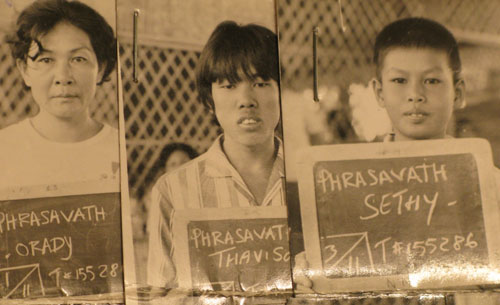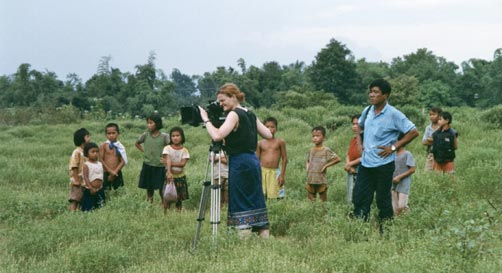
Ellen Kuras Wins Cinematography Honor at Santa Fe Film Fest
In The Summer of Sam, Ellen Kuras took us back to the look and feel of the sweaty fearful days of 1977. If David Berkowitzs notorious murder spree targeting dark-haired girls in parked cars werent enough, there was the blackout that burned huge areas of Brooklyn. The film was released in 1999, enough time for there to be some nostalgia for the old days. (It screens at 9:30 Friday night as part of the Santa Fe Film Festival, which honors Kuras with a Milagro award tomorrow.)
Does anyone remember? For anyone born after 1977, The Son of Sam might as well be a reality TV show. Back in those days, before that genre took shape, thats just what it was on the local TV news.
Evoking the white Italian-American Bronx of those years was an achievement for the cinematographer, who worked on other collaborations with SoSs director, Spike Lee. The sequences of David Berkowitzs personal horror were gripping enough to be in a gore film ““ as opposed to a film about a serial killer.

The Betrayal: Nerakhoon
Ellen Kuras has a long resume ““ Swoon, Unzipped, I Shot Andy Warhol, Blow, Analyze That, Eternal Sunshine of the Spotless Mind, Be Kind Rewind, and the list goes on. For Kurass fans, and Im one of them, the film to see is The Betrayal: Nerakhoon, her debut as a director.
Even by the standards of independent documentaries, Ellen Kurass They Betrayal was the new plus ultra of ultra-marathons. For her directorial debut, the cinematographer spent 23 years on and off with the family of her co-director, Thavisook Phrasavath (Tavi), as Laotions settled in New York City and adjusted uncomfortably into a new culture after being ousted as pariahs from Laos. It wasnt easy for them.
The Betrayals often elegant, often harsh imagery, and the familys poignant story won her critical support when it premiered at Sundance in 2008. Its an immigrant saga, and the documentary, which aired on public television, will test in its shelf life whether the public in the US, UK and Western Europe that is concerned about immigration will watch a rigorously researched account of one familys experience. These days, the immigration “crisis” that threatened to trigger a civil war on the borders seems to be yesterdays news. Thats a shame.

Ellen Kuras filimg The Betrayal
The Betrayal examines a series of betrayals in Laos over the last 40 years. Archival footage shows us the US war in Vietnam, which bled across the border into Laos, as bombing by the US ravaged the countryside and Laotian government soldiers fought alongside US troops. American officials like Richard Nixon deny any involvement in the warfare. Who remembers? It was one of Nixons many hollow denials.
The family of co-director and narrator Thavisouk Tavi Phrasavath was in the midst of the war. His father was an officer fighting the communist Pathet Lao in the Royal Army. When the US abandons the war, betraying Laotians who had supported the Americans, the Pathet Lao, take power. Tavis father is imprisoned and the new government betrays its own supporters, and turns vengeful and punitive. Tavi swims across the Mekong River to Thailand at the age of 12 to join his family in a refugee camp, and they finally reach the United States. Its a miracle that they made it. Kuras conveys all the drama as family members tell their stories.
In Brooklyn, where they finally settle, theres trouble in paradise. A crack house is next door, and the family is victimized by local criminals, and then besieged by violent Laotian gangs. When Tavis father finally rejoins them, a new betrayal is in store – he has another family in Florida.
Kuras shoots the American Dream for one family as a collection of cases of survival and compromise, shifting from scenes of war, to stark sequences of Brooklyn squalor that seemed ripped out of a grim reality show, to the Americanization of the younger generation.
The ambition of The Betrayal takes us beyond Hoop Dreams, the documentary which followed two high school basketball players over two years. Unlike Crumb, which followed an artist over seven marathon years, this documentary tracks the many members of a family for more than two decades.
The family never stops struggling, whether it is through robberies, funerals, or infidelities. The sequences that provide relief are contemplative shots of the Laotian countryside and reflective soliloquies from the narrator, Tavi, whose composure and understated observations in his first-person narration make him the antithesis of the wise-cracking Morgan Spurlock or Michael Moore.
Kuras has assembled a remarkably thorough account of a familys ordeal, edited to compelling effect by Tavi, who became a film editor in New York. In The Betrayal, Kuras has constructed is a powerful work of anthropology. That should not be a reason to avoid seeing it.
